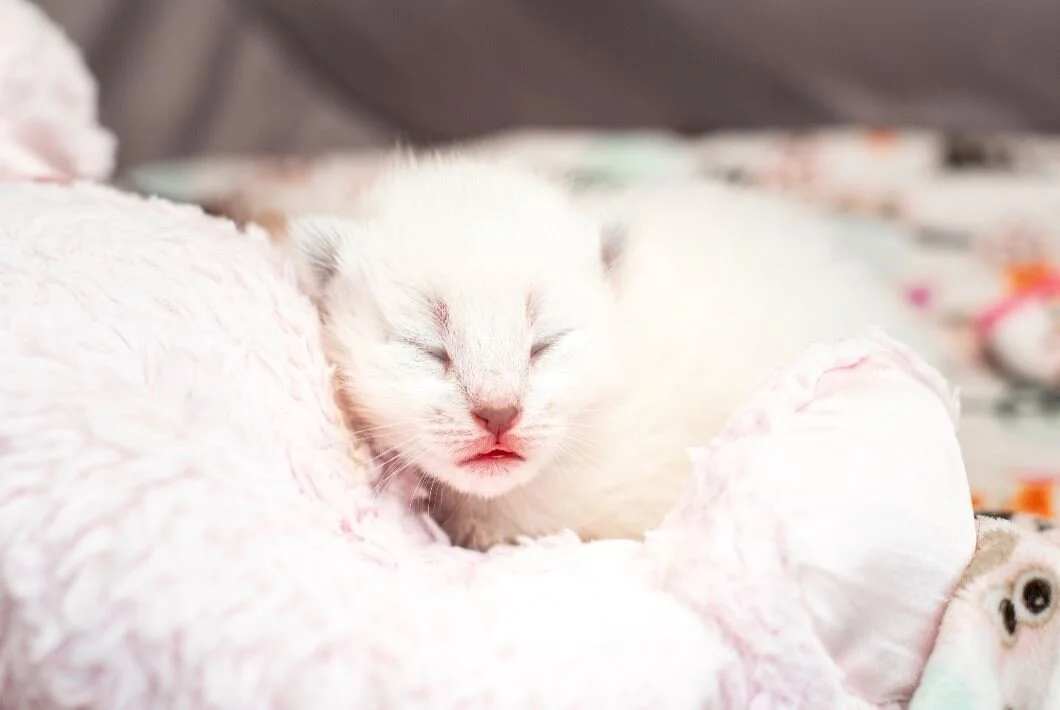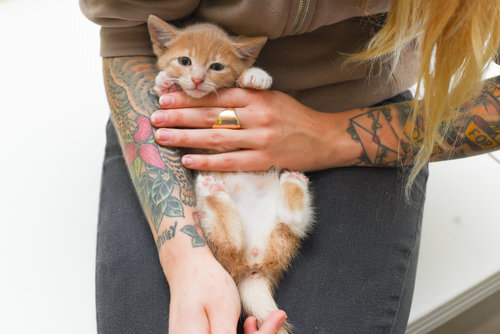Grieving the Loss of a foster Kitten
The loss of an animal is the hardest thing a foster parent ever has to go through, and unfortunately for those of us who foster kittens, it is something that does happen. Orphaned and neonatal kittens can become ill and fall into critical condition even with wonderful care, and it’s important for anyone fostering kittens to know that if you experience loss, you are not alone. While nothing can make loss any easier, there are things you can do to cope with grief in the aftermath.
Grieve In the Way That is Right for You
The first thing to know is that every person navigates grief differently, and you should listen to yourself and grieve in the way that is best for you. No one can tell you how to process grief, as it is an individual experience. If you want to talk about it, that’s great—call your friends, talk to your foster coordinator, or even have someone come over to comfort you. If you don’t want to talk about it, that’s also OK. Some people process things internally, and that’s absolutely fine.
Be Gentle With Yourself
You’ve just gone through something traumatic, so please be gentle with yourself. Know that it is normal and even cathartic if you feel the need to cry, and you should allow yourself to feel and express any emotions that arise. You may feel a deep sense of injustice that the kitten’s life has been cut so short. You may feel angry that the kitten suffered. You may feel confused about what caused the kitten to decline. You may feel anxious about what to do now. Listen to your feelings and let yourself process them.
Challenge any feelings of guilt that may arise. Recognize that you are truly the best thing that ever happened to that kitten, because your home is where she found love and comfort, even for a short period of time. Remember that the reason you feel grief is because you also feel great love, and that love is what makes you such a special person—such a compassionate person—and such a great advocate. That love is how you know that you have a big heart, and that you’ll be able to save so many lives in the future. You are courageous, you are resilient, and you are strong.
Care for yourself as you would someone you love. What do you need right now? Maybe you need to be distracted by a funny movie or a good book. Maybe you need to go for a run or do yoga. Maybe you just need to put on sweatpants and take a nap, or draw yourself a bubble bath and soak. Whatever you need, give that to yourself.
Lean On Your Community
Tell your friends and loved ones the best way to help you through this. The only way people know how to help is if you communicate to them, so let them know if you want to be consoled, hugged, or even left alone. It may be helpful to talk to other foster parents who can relate to what you’re going through. Talking to people who have shared this experience can help you feel less alone. If you don’t have another foster parent you can call, try finding people who can empathize in an online social media group.
See Loss as a Learning Opportunity
Loss is not failure. Loss is, in fact, a tremendous opportunity to grow your knowledge and skillset in order to save more lives in the future. Many people find it healing to spend some time learning about the specific condition, or learning new critical care skill sets that may be helpful in the future. Do research, talk to your foster coordinator or veterinarian, read information about kitten health, take notes on what worked and what didn’t, and empower yourself with knowledge. The truth is that those of us who have lost foster kittens are often the best situated to save more kittens in the future. With each critical kitten comes invaluable knowledge that can—and will—save future lives.
Let Your Grief Be Your Fuel
Grief can be good fuel to make a positive change in your community. Do something to honor the life of the kitten you’ve lost. Maybe you can TNR the cats in the neighborhood where the kitten was found, to prevent future suffering. Maybe you can ask your friends to donate to a nonprofit organization that saves similar kittens, such as the Orphan Kitten Club #Mightycat Program which funds medical care for kittens. Doing something in honor of the little life lost can create meaning and healing, and help you feel that the kitten was a force for immense good in the world.
Take a Break, But Not For Too Long
If you want to take a break from fostering, that’s totally ok to do. Not only is it acceptable to pause, but a short break can actually be integral to one’s healing process and ability to continue on in a sustainable manner. Of course, if you want to go get new foster kittens quickly, that’s ok too, provided that you’ve sanitized your space thoroughly to prevent new kittens from contracting any illness.
Many people report that their heart begins to heal once they begin fostering a new animal, so when you’re feeling ready, try diving back with an easy foster to boost your spirits—maybe some older or healthier kittens, a mom with healthy babies, or even an adult cat. Heck, maybe you want to foster a dog or a guinea pig! It’s really up to you.
Whatever you do, don’t let this experience stop you from continuing to save lives. It’s those of us who have experienced loss who make the best foster parents, because we know so much more about early signs to look out for, we know so much more about these specific conditions kittens suffer, and we have the cumulative skills to save the most vulnerable lives. So if you’ve lost a kitten, please take care of yourself—because we need you, and we need you to be well.
—
Further suggested reading:
It’s OK That You’re Not OK by Megan Devine
Tiny But Mighty by Hannah Shaw
Grief Resources by PS I Love You More Than Tuna




